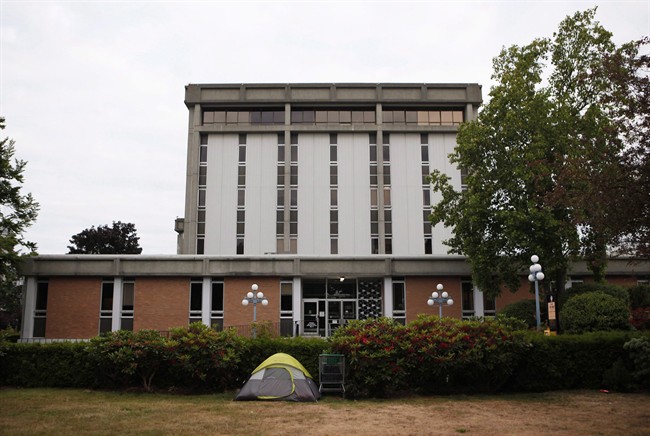VICTORIA – Wet, cold and windy nights adjusting tarps and pounding pegs into the soggy ground are about to come to an end for John Bertrim and dozens of others who have slept in tents on the Victoria Law Courts’ lawn for months.

Eric Lincoln also said Monday he is getting ready to take down his tent for a move indoors after two months’ sleeping outdoors at the courthouse.
Bertrim, his common-law partner Laurel Hanuse and Lincoln are among the first homeless people to volunteer to vacate the bedraggled tent village that sprung up last spring at the courts for a move into a temporary, government-funded shelter at a former Victoria Boys and Girls Club facility.
“You need lots of tent pegs, lots of tarps to make sure your home is secure,” said Bertrim, who is 39, noting he’s been homeless for the past year.
Tents blow away in the wind, he said.
Lincoln, 44, said he arrived at the camp to be near his street friends after his wife Belinda Jack died in November. He said he’s looking for a fresh start after too many bad choices, family break ups and personal losses.
“It’s very community oriented here,” he said. “Everybody looks after everybody and the community has been very giving.”
People regularly arrive with food, clothing and cash, but it hasn’t been a complete utopia, with at least one drug overdose death and a stabbing incident that sent one man to hospital and saw police chasing the male suspect through the leafy downtown neighbourhood.

Get breaking National news
The camp fills the courthouse lawn with all sizes and colours of tents. The City of Victoria installed portable toilets and left a dumpster. A steel drum burns damp wood, emitting clouds of dense smoke that mingles with the constant smell of marijuana.
Starting Tuesday, 40 people will leave the urban campground for warmth, food and help, but not a permanent home.
Victoria Mayor Lisa Helps said 110 people are currently camping at the courthouse grounds, but the $500,000 shelter project can only take 40 people. The British Columbia government is contributing $400,000, Victoria $75,000 and the United Way is contributing $25,000.
Helps said the shelter project includes indoor tents for privacy, three meals a day and services to help people find permanent housing. It is not a drop-in centre, she said.
“There’s basically a bedroom set up for everyone,” she said.
Helps said Victoria has been working with the government to ensure the remaining courthouse campers can stay at the site, even though the province owns the land.
“We’ve been working hard with the province to not do anything to the people who are still there except continue to work to try and find housing,” she said.
Victoria has been wresting with the issue since a 2008 court ruling allowed people to pitch their tents in city parks when shelters are full.
Helps said the city spends $600,000 annually on staff to clean up parks and police officers who enforce the bylaw that requires people to break camp at 7 a.m.
She said the courthouse camp has put pressure on the city and the province to address the homeless issue in Victoria. Helps said she understands concerns of residents who question placing people with drug and mental health issues near school.
“I feel like the city’s been put in a very difficult position because the only vacant building we have happens to be beside a middle school,” said Helps.
Opposition New Democrat housing critic David Eby said homelessness is a provincewide issue.
“It is a sad comment on the inadequacy and unavailability of shelters in B.C.,” he said. “This is not a problem that is going to go away.”
Rich Coleman, B.C.’s minister responsible for housing, was not available for comment, but his ministry’s website states that since 2001 the provincial government has invested $4.4 billion to provide affordable housing for low-income individuals, seniors and families.







Comments